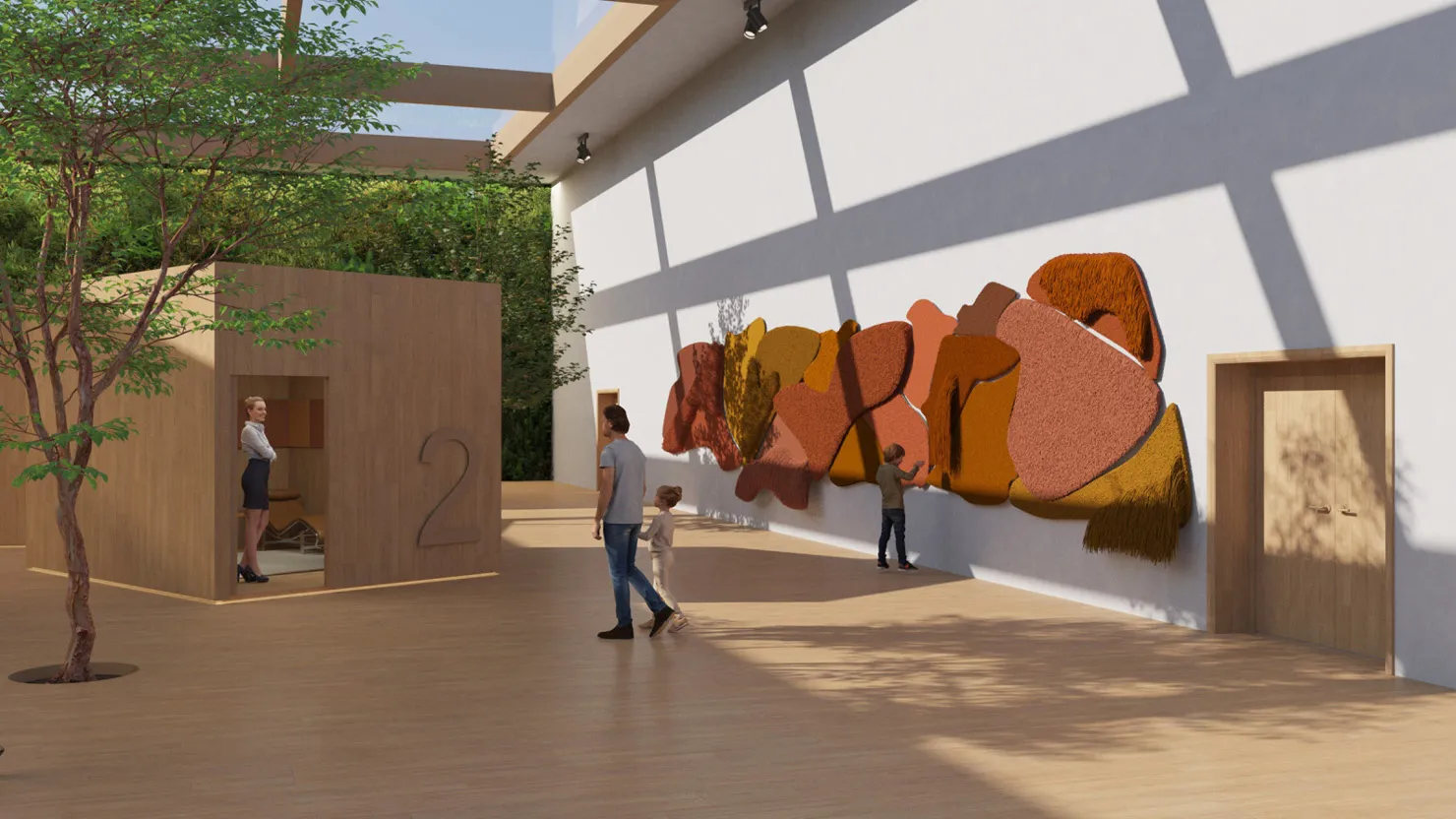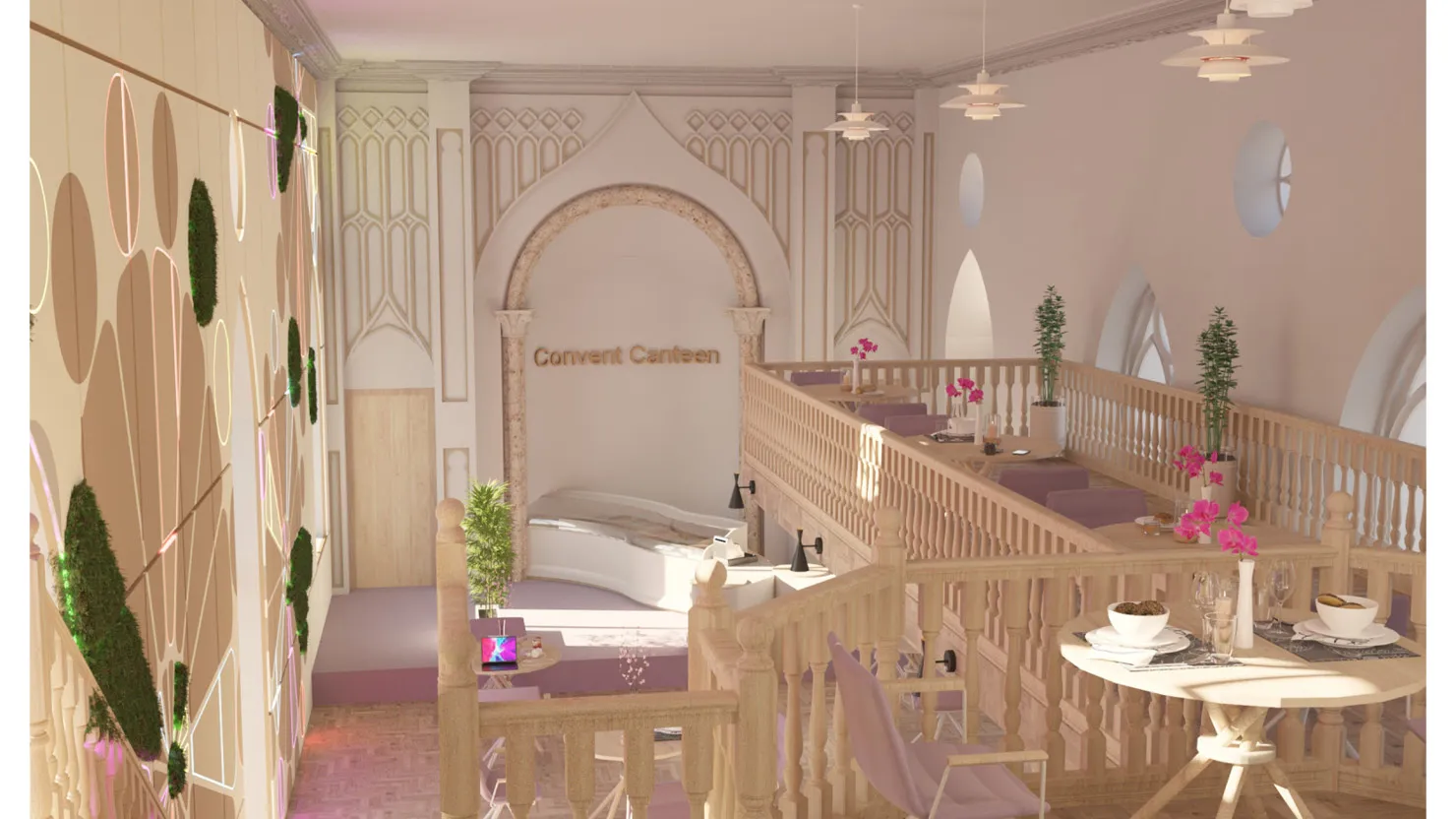BA (Hons) in Interior Architecture

Course Overview
Demonstrate your creativity, technical ability and problem-solving expertise
If you are looking for a well-respected, challenging Interior Design course with an included focus on architecture in Dublin, this is the course for you. Check out Griffith Creative 2024 to view our final year student's work and see what you could create as part of Griffith College Design.
Why study Interior Architecture at Griffith College?
This degree programme has been designed in response to an increased demand for employees with specific skills relating to Interior Architecture including spatial planning, design detailing, technologies, problem-solving and visualisation techniques and presentation skills. The course takes students through the fundamentals of visual culture, building science and design principles and equips them with practical studio skills.
Students are required to take part in in-depth research, apply knowledge of building technology and regulations, organise and manage project solutions, and communicate their designs using digital design programmes. Graduates of this programme leave with extensive experience in creating, analysing and interpreting project briefs. They will be able to problem-solve complex design issues and work independently and in groups to find solutions.
- A rigorous, in-depth course programme will teach you to create, design, problem-solve and act professionally in all related working environments.
- Gain extensive experience in creating, analysing and interpreting project briefs, skills which will enable graduates to problem-solve complex design issues and work independently and in groups to find solutions.
- The practical nature of this Interior Architecture course will make you industry ready, creatively and technically equipped to propose innovative solutions and problem-solving expertise within the built environment.
- Full access to Student Adobe Creative Cloud - All Apps plan, which gives you 20+ cutting-edge creative tools for desktop, mobile, and web
- Use dynamic architectural modelling software like Revit, AutoCad 3-D, AutoCAD, as well as traditional communication tools such as model making and free-hand drawing.
- Develop advanced skills in space planning; design detailing, materials selection and specification
- This programme is validated by the European Council of Interior Architects (ECIA) and the Institute of Designers in Ireland (IDI).
- 100% continuous assessment means learners do not need to sit written exams.
- The calibre of work produced by the Design Faculty has been recognised numerous times through industry awards and exhibitions.
*If your intention is to pursue a career as a licensed architect in Ireland, and become a member of the RIAI, it is advisable that you consider alternative educational pathways that align with the recognised qualifications and accreditation set forth by that professional body.
This information specifically pertains to the recognition of this BA (Hons) in Interior Architecture by the RIAI in Ireland ONLY. It is recommended to check the accreditation status of any programme with the relevant professional bodies in other countries, as recognition may vary.
Course Highlights
- Interior Design Internships - Design students have had internships with HJ Lyons and Jonathan Adler N.Y.C. to name just a few.
- Field Trips - Experiential learning is an important part of our courses, therefore most modules have class trips as a part of their curriculum. Previous trips have included London, Rome, Milan, Berlin, Paris, Bilbao, Barcelona, and Venice.
- Industry links - During the course you’ll be taught by practising architects, designers, and art historians, ensuring that the faculty maintains strong industry links.
- Creative Show - Check out the Griffith Creative Show 2023 website to see the final year work.
Questions? Have a look at our FAQ section.
Intake Dates
- Dublin - Full-Time - September 2025
Are you applying through the CAO?
Check out our CAO HUB for more information about applying through the CAO!
Course Codes
- Dublin: GC489
What our students say?

This is my first experience studying abroad, and I really love this country and college. I love the people and how I feel connected to the culture here, as well as seeing everything that's happening.
Interior Architecture

I love the size of my class. We have a really small, close-knit group, and I've really enjoyed getting to know everyone. We've become like a little family after working together for three years now.
Interior Architecture
Course Details
On completion of this course, students will have advanced skills in space planning, design detailing, materials selection and specification. They will gain insight into the social implications of design and understand at a deeper level how design and community interact in the real world.
Year One
This module enables learners to apply their learning to Interior Projects. The module introduces the learner to concept generation, experimentation, convergent and divergent thinking, and the relationship between form and function. Learners will develop and design two projects, which will equip them with creative design solution skills by formulating a problem-solving approach and presentation skills to successfully represent their vision.
The module enables the learner to observe, understand and appreciate Ergonomics and Anthropometrics in design of interiors.
The module introduces principles of a series of architectural drawing techniques using pencil and ink and 2D CAD. The module enables the learner to develop skill in the use of architectural drawing using pencil and ink and 2D CAD as a means of communicating design ideas
The module enables learners to develop skills in three design communication tools and printing. The learning outcomes of this module underpin a lot of the learning to be applied in other modules and so contribute to most of the intended programme learning outcomes.
The module provides learners with an overview of the history of interior design, architecture and decoration from ancient times to current day, with a particular focus on European interior and architecture, and the impact of key genres.
The module enables the learner to observe, understand and appreciate how interior spaces function and how the user engages materials and finishes within the enclosed volume of the built environment.
The module introduces the learners to materials used in designing Interiors and their environmental impact, display and awareness of ethical, social and community implications in sustainable, responsible and inclusive design in construction.
This module enables learners to apply their learning to Interior Projects. The module introduces the learner to concept generation, experimentation, convergent and divergent thinking, and the relationship between form and function. Learners will develop and design two projects, which will equip them with creative design solution skills by formulating a problem-solving approach and presentation skills to successfully represent their vision.
The module builds on skills gained in Architectural Drafting & 2D CAD and to introduce advanced detailing using 2D CAD. The module also introduces principles of 3D modelling techniques using 3D CAD. The module introduces principles of a series of architectural drawing techniques using 2D CAD and 3D modelling techniques using 3D CAD.
The module gives learners a broad understanding of the requirements imbedded in the Building Regulations. This module addresses the requirements of the Technical Guidance Documents with focus on Fire Safety and Accessible strategy for their design work, and enhance creativity by using the information within the Building Regulations as the building blocks to create dynamic, imaginative yet safe spaces. The module also introduces Health and Safety requirements Designer Risk Assessments when completing Interior Design projects.
The module enables learners explore lighting solutions and abilities by examining theory, research and samples, and to demonstrate knowledge of how to applying creativity and innovation to their interior lighting solutions.
The module gives learners a broad understanding of historical, cultural, social and political contexts in which Modern and Postmodern design evolved. The learning outcomes of this module underpin some of the learning to be applied in other modules (Visual Culture and Theory; Design Futures; Dissertation) and so contribute to some of the intended programme learning outcomes.
Year Two
The module introduces the learner to examine the realisation of design ideas as a cohesive and successful interior design project using the integration of technical, BIM and demonstrative skills. The module enables learners to practice advanced creative concept and design development methodologies, and visual presentation skills relevant to industry expectations. The finished piece is envisioned to be of sufficient quality for inclusion in a portfolio that learners submit to national and international competitions, and to show to potential employers upon graduation.
This module enables the learner to develop basic skills in Building Information Modelling (BIM) using Revit. Within the module learners are facilitated (learning by doing) to develop the skills to construct basic 3D models relating the built environment, and for interiors to include lighting. In completing the model, learners will be facilitated to research and select appropriate products, materials and fittings using their understanding of technology and professional standard specifications gained though the programme.
The module gives learners a broad understanding of design, manufacturing and sourcing process in relation to furniture. The module is to enable the learner to develop skill in designing and detailing innovative furniture and fittings solutions.
The Design Futures module provides learners with a broad understanding of theoretical contexts of major movements in art, design and visual culture – both historical and contemporary.
This module provides crucial context for creative activity, working in tandem with practical modules by exposing learners to major concepts, structures, thinkers and practitioners.
The module enables learners to explore entrepreneurial aspirations and abilities by examining entrepreneurial theory, research and process.
The module introduces the learner to examine the realisation of design ideas as a cohesive and successful interior design project using the integration of technical, BIM and demonstrative skills.
The module enables learners to practice advanced creative concept and design development methodologies, and visual presentation skills relevant to industry expectations. The finished piece is envisioned to be of sufficient quality for inclusion in a portfolio that learners submit to national and international competitions, and to show to potential employers upon graduation.
This module enables the learner to develop advanced skills in Building Information Modelling (BIM) using Revit. This module builds on the technical and computer application skills developed by the learner in Introduction to BIM to further support their engagement with BIM projects. Learners carry out cloud-based daylight and performance analysis.
The module introduces the learner to the detailed design of buildings and interiors, including application of statutory requirements. It also aims to enable the learner to develop skills in the technical detailing of Interiors and the external building fabric.
The module enables learners to explore entrepreneurial aspirations and abilities by examining entrepreneurial theory, research and process.
The module enables the learner to understand sustainability as a necessary element in designing Interiors and implement this concept in their project work, making informed choices concerning the most current sustainable strategies for interior design projects, and have a specialised knowledge of same. Learners will formulate and implementing a sustainable approach when designing an interior Environment.
Year Three
In this module, learners balance the integration of detailed design theory and technical skill. It creates opportunities for learners to take individual design responsibility of their process and their product. The module enables learners to develop their knowledge of current developments/research/technologies relating to interior architecture and building design.
This module enables the learner to develop skills in BIM Collaboration using Revit. This module builds on the technical and computer application skills developed by the learner in Advanced BIM to further support their engagement with BIM projects. They learn how to export the BIM model from a BIM tool to use in other tools applications. Learners also develop skill in BIM 360 (collaboration), BIM Management and clash detection.
This core module will be the culmination of the learner’s study. Learners will explore, through research and writing, subjects deemed worthy of academic investigation, or the expansion and development of new ideas through practice. The learner may select to present an academic dissertation or a dissertation by practice.
The module enables the learner to understand architectural conservation as a specialist element in designing Interiors and incorporate this concept in their project work as appropriate. Learners will make informed choices concerning the most current conservation strategies for interior design projects and understand the requirement for the external specialised knowledge on the project. Also, to formulate a conservation impact report and apply appropriate detailing and materials when designing an interior environment in historic context.
This module enables learners to synthesise their learning across all stages of the programme. It presents learners with an opportunity to focus on creating a significant professional, industry-standard project which showcases a range of skills and knowledge. The project is the core study area and learners become familiar with the advanced skills, tools and techniques used throughout the design process.
The module enables learners to practice advanced creative concept and design development methodologies, and visual presentation skills relevant to industry expectations. The finished piece is envisioned to be of sufficient quality for inclusion in a portfolio that learners submit to national and international competitions, and to show to potential employers upon graduation.
This module enables the learner to develop advanced rendering skills using rendering software. They will be facilitated to research and specify materials, textures, natural and artificial lighting to support an accurate and photorealistic visualization of a proposed design. Learners will focus on the generation of interior and exterior renders from 3D model views, and produce a walkthrough, using advanced rendering techniques. Work-flow skills will be developed through learning by doing.
This module provides learners with the means to understand the role and various tasks of a project manager within the building industry. The module also develops learners awareness of the skills and competencies required within the project team. Skills developed through the module bring leadership and direction to projects allowing learners to fully appreciate the challenges organisations face in dynamic and changing built environments. Project management creates and enables motivated teams who know their work is valued, so to optimise their performance. Project management enables teams to ensure the deliverables are correct and there is a real return on investment.
The module introduces materials science and structural mechanics in Interior Architecture, and enables the learner to cultivate knowledge of the inherent qualities of materials used and to appreciate the necessity of structural design in Interior Architecture projects.
This module introduces learners to the role and importance of management within an organisation. Learners develop an awareness of how organisations relevant to the built environment need to adapt to a dynamic and changing business environment. The module furthers learners’ skills and abilities in terms of key aspects of effective management such as analytical skills, communication, and decision-making and problem-solving skills. Learners develop their ability to think critically, show initiative and advance their own holistic solutions to organisation-wide challenges which face managers.
Timetables
Full-Time Programme:
Monday - Friday from 10 AM - 5 PM.
*Timetables are subject to change. For the most up-to-date information, please contact the Faculty directly.
How to Apply
Entry Requirements
All applicants for this course must submit a general art and design portfolio.
Portfolio Requirements:
All applicants to this programme are required to submit a general art and design portfolio, demonstrating creativity and observational drawing skills through the development of creative project work. Our portfolio guidelines are available here, and we recommend watching this helpful video for information on what to include in your portfolio.
Please upload your portfolio using this platform: here
All candidates are required to upload a digital portfolio. Before you begin, you will need a CAO Application Number or a Griffith College application number so please make sure you have made an application to the CAO or to Griffith College (as appropriate) for one of our Honours degree programmes.
Deadline: Candidates will have the opportunity to select an assessment date when uploading their portfolio. You must upload your portfolio by your chosen date. If you are unsure of how to upload your portfolio, follow the steps in this instructional video.
- Friday, 26th January 2024
- Friday, 23rd February 2024
- Friday, 29th March 2024
- Friday, 26th April 2024
- Friday, 31st May 2024
- Friday, 28 June 2024
If you have a query or you require further information about submitting a portfolio, please contact admissions@griffith.ie.
Advanced Entry:
Level 5 holders:
Candidates with a Level 5 qualification who obtain 3 distinctions and 5 passes (plus a portfolio) may be eligible for entry onto year 1 of this course. Candidates under 23 years of age still need to apply through the CAO. Mature students can apply directly here.
Level 6 holders:
Applicants with a Level 6 qualification in a related discipline may be eligible for advanced entry onto this course. Candidates will be asked to provide relevant transcripts and a portfolio of work in support of their application. Pending the strength of the portfolio, candidates may be eligible for entry onto year 1 or year 2 of this programme.
All candidates with a Level 6 qualification, regardless of age, will need to apply directly here.
*Please note, advanced entry applications are assessed on a case by case basis and offers are made at the discretion of the faculty.
English Language:
Applicants from countries where English is not the first language will also be required to provide evidence of sufficient English language abilities.
Griffith College is accepting the online Duolingo English Test (DET) as valid proof of English proficiency.
For more information, please visit here.
For more information on any of the above, please contact admissions@griffith.ie.
How to Apply
CAO Applicants / Applicants under 23 years of age:
Applicants under 23 years of age on 1st January the year the course begins must apply through the CAO system. Please consult the CAO website for details on key dates for applications.
Applicants under 23 years old on the 1st January the year the course begins must submit a copy of their Leaving Cert results. Candidates will need to have obtained a minimum of two subjects at grade H5 and four subjects at grade O6/H7. These results must include a language (English or Irish) and either Maths or Art.
Candidates with equivalent grades from FETAC colleges and those holding awards including BTEC qualifications will also be considered.
CAO course code: GC494
Applicants over 23 years of age (Mature students):
Applicants who are 23 years of age on or before the 1st January the year the course begins, may apply as a mature student. Mature students must apply to Griffith College directly online using the Apply Online facility.
Fees
For purposes of fee calculation, residence is counted from the time of application.
Please note that not all study modes may be offered at all times. For confirmation, refer to the intake dates in the Overview tab.
Tuition Fees
Study Mode: Full-Time
Dublin: EUR 6,850.00
Study Mode: Full-Time
Please refer to the Irish/EU Living Abroad Fees section.
Study Mode: Full-Time
Dublin
Non-EU living in Ireland or abroad: Please refer to our Non-EU Tuition Fees section.
Non-EU students: a Student Services and Administration fee of EUR200 is payable each academic year in addition to the fees quoted below.
An Academic Administration Fee of EUR250.00 and a 2% Learner Protection Charge is applicable each academic year in addition to the fees quoted. The fees relate to Year 1 fees only.
Flexible payment options
Students wishing to pay their fees monthly may avail of our direct debit scheme. Please view our Fees information page for more information and assistance.
Sponsorship
Is your company paying for your course?
They will need to complete a Griffith College Sponsorship Form and send this to the Student Fees Office:
- Post: Student Fees, Griffith College Dublin, South Circular Road, Dublin 8
- Email: accounts@griffith.ie
2% Learner Protection Charge
All QQI accredited programmes of education and training of 3 months or longer duration are covered by arrangements under section 65 (4) of the Qualifications and Quality Assurance (Education and Training) Act 2012 whereby, in the event of the provider ceasing to provide the programme for any reason, enrolled learners may transfer to a similar programme at another provider, or, in the event that this is not practicable, the fees most recently paid will be refunded.
QQI Award Fee
Please note that a QQI Award Fee applies in the final year of all QQI courses. To find the relevant fee for your course level, please see the Fees page.
Progression
Academic Progression
You’ll have an extensive knowledge of spatial planning, visualisation, and CAD technology as well as experience with project briefs and project management upon completion of this course.
You can contact our admissions team to discuss what progression options are available to you.
Career Progression
Through the BA (Hons) in Interior Architecture, you will have gained valuable design experience, built a strong foundation of creativity, and covered a diverse range of topics. There is a wide range of career options for our graduates including:
- Interior Architecture
- Own Design Practice
- Residential Interior Designer
- Retail Store Designer
- Film and Set Designer
- Hospitality Designer
- Exhibition Designer
- Office Designer
- Facilities Space Planner
- CAD Technician
- 3D Visualizer
- Material Consultant
- Interior Project Director
- Interior Design Project Manager











